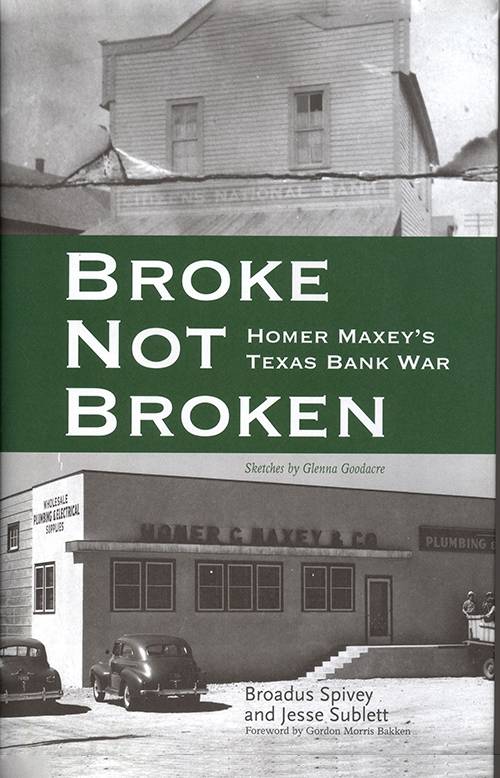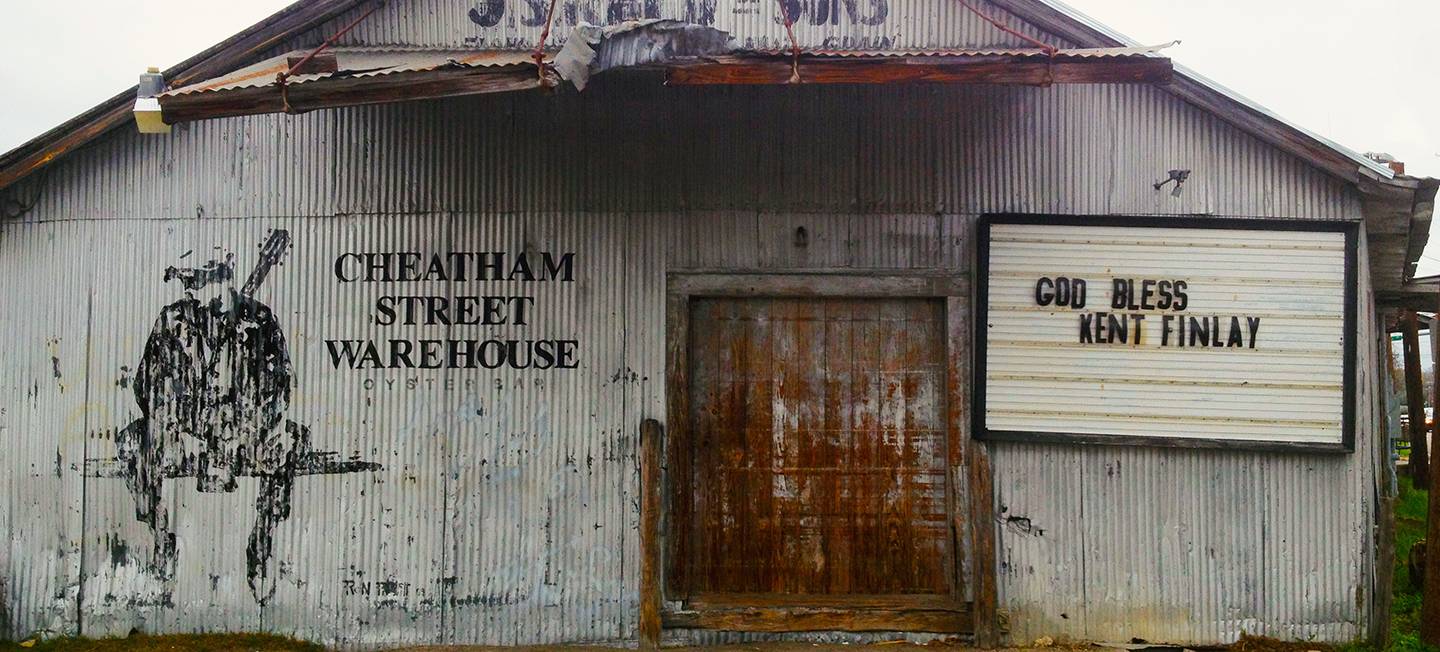
Broke, Not Broken:
Homer Maxey's Texas Bank War
by Broadus Spivey and Jesse Sublett
Lubbock: Texas Tech University, 2014
338 pp. $29.95 cloth.
Reviewed by
Michael Ariens
“Who was Homer Maxey? And why should readers be interested in his nearly fifty-year-old lawsuit against Citizens National Bank of Lubbock? Unfortunately, Broadus Spivey and Jesse Sublett, the authors of Broke, Not Broken: Homer Maxey’s Texas Bank War, fail to give the reader a good reason to invest the time in considering possible answers to those questions.”
Who was Homer Maxey? And why should readers be interested in his nearly fifty-year-old lawsuit against Citizens National Bank of Lubbock? Unfortunately, Broadus Spivey and Jesse Sublett, the authors of Broke, Not Broken: Homer Maxey’s Texas Bank War, fail to give the reader a good reason to invest the time in considering possible answers to those questions. They do so for two reasons: the authors couldn’t decide which of four or five overarching (and interesting) stories they should tell, and the story they tell of the lawsuit is a didactic and inapposite story of David (Maxey) and Goliath (Citizens National Bank).
Homer Maxey was a hustler. Born in 1911 in Lubbock, he opened his first business during the Great Depression while a student at Texas Tech. During the following thirty years, he bought and sold several businesses, was a founder of a bank, and by the early 1960s had become a multi-millionaire. Homer Maxey was also a son. His father, J. B. Maxey, was a successful businessman in Lubbock. Homer was also a brother, the oldest surviving child of five boys (the eldest died at six months). Each of his five surviving brothers followed their father by becoming Lubbock businessmen. He was a husband who married his high school sweetheart at age twenty-one. He was a father of two girls. And he served honorably in World War II as a naval officer.
Homer Maxey’s full life might have served as a study, writ small, of how the United States prospered economically in the twentieth century. Some of Maxey’s business affairs concerned the building of Lubbock, and his story might have been used to explain how mid-sized American cities grew during this time. Because his economic downfall involved in part his disastrous decision to purchase and attempt to renovate a downtown Lubbock hotel, the story might have discussed some of the consequences of suburbanization, which gained Homer Maxey much of his initial wealth. These riches dissipated because, when Citizens National called its loans, Maxey had no ability to pay, and so the bank foreclosed on Maxey’s assets securing the loans, including his ranch lands and a corporation that held much of Maxey’s wealth. The authors might have investigated the long-standing animosity of Texans toward banks. One of Maxey’s lawyers in his business ventures also represented the Citizens National Bank, and decided to represent the latter in Maxey’s lawsuit against the bank. The authors (one of whom, Spivey, is well known in Texas for his legal malpractice work) could have shined a light on what lawyers do and whether the bank’s lawyers conformed to the norms of legal ethics in this matter. The authors could have told a story of hubris or mid-life crisis, for Maxey’s decisions as he entered his fifties to buy and renovate a failing downtown hotel and to purchase thousands of acres of ranch land to run cattle seemed in hindsight doomed to failure. Finally, the authors could have told an analytical story of how Maxey took on (and was allowed to take on) so much debt. The bank’s efforts to collect on Maxey’s debt, and Maxey’s lawsuit in response, could have been used to discuss the legal and policy implications of debt and debt collection, particularly apt since the Great Recession.
But the authors chose to cast an experienced and wealthy businessman (they note he “was a member of an elite circle of powerful Lubbock citizens known variously as the ‘empire builders’ or the ‘king makers’”) as a naïf. And Citizens National Bank was the designated villain.
So when the bank called its loan, “[t]he redistribution of Maxey’s assets took place in secret, without the benefit of advance notice for a public auction.” Further, “[t]he transaction that seemed to shock people most, however, was the ‘fire sale’ price tag assigned” to the corporation that owned most of Maxey’s assets. It is only much later in the story that the reader learns that Citizens National never collected all the money owed it by Maxey. What is more disturbing than claiming a mid-sized bank in a mid-sized Texas city conspired to ruin an empire builder like Maxey are the allegations that the two district judges in the two trials were somehow beholden to the bank, and made decisions that violated their oath of office. I will not repeat those allegations, but I find them unpersuasive, indeed specious.
The authors also present, with a straight face, the claims by one of Maxey’s lawyers (he seemed to go through them like water) that a) the lawyers’ luggage at the Lubbock airport was intentionally mixed up with other luggage, so that the defendants certainly “had enough time to go through them,” b) the phones used by Maxey’s lawyers were tapped by the defendants, including the lawyers for the defendants (if true, this should have subjected the lawyers to criminal charges and certainly, lawyer discipline), c) that someone (an agent of the defendant?) cut the power steering of the lawyer’s car, and “they” (no antecedent given) “were going to try to do something. Kill me, injure me, whatever,” d) the defendants had an “attractive young woman,” a former “Maid of Cotton,” engage in sex with the lawyer to attempt (and fail!) to gain information from him about the case, and e) that this lawyer “remains one hundred percent convinced” that a plane crash involving a witness whose testimony might have benefitted Maxey “was the result of sabotage.” The identity of the saboteur is unstated. The only “evidence” given for these heinous actions (trying to murder a lawyer or witness) is self-serving and narcissistic statements of Maxey’s lawyer, who lacks personal knowledge of any of these claims. The decision of the authors to include these claims must have been made in a desperate attempt to make a pedestrian lawsuit seem more important (or more thrilling) than it actually was. This decision was at best unprofessional, and at worst, shameful.
Maxey won a jury verdict and judgment at the first trial, which was reversed on appeal. The Supreme Court of Texas reversed the opinion of the appeals court and ordered a new trial. Maxey again won a verdict, which again was reversed on appeal, and remanded for a third trial. With his third lead lawyer representing him, Maxey settled with Citizens National for $2.2 million in 1980. The authors quote Maxey’s daughter Carla on her thinking as the case first came to trial in 1969: “We knew his side of the story and we believed it. But I went into the trial with an open mind because I felt like there are two sides to every story.… You assume it had to be a case of right and wrong, but it really wasn’t that at all.” Lawyers learn this lesson quickly. It is disappointing that the authors didn’t take Carla’s cautionary statements to heart when writing Broke, Not Broken.
Michael Ariens is a professor at St. Mary’s University School of Law in San Antonio, Texas.
